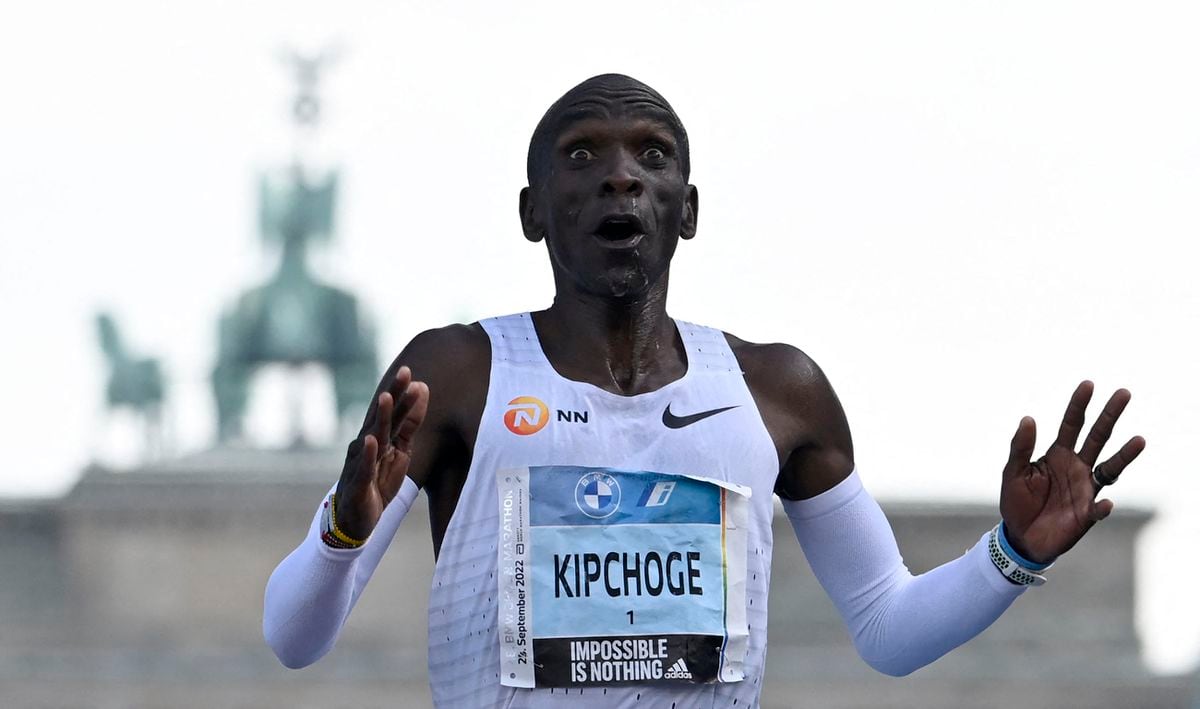There is no marathon with more tradition than the Boston Marathon or a bigger marathoner than Eliud Kipchoge. Between the two of them, in the last decade they woven an impossible love story that only age, perhaps, or the awareness that the end is near, has put an end to. They ring, revelry, joy, wedding bells. Already turned 38, and in his eleventh year as a marathon runner, the double Olympic champion and double world record holder, has said yes. The union, which due to its greatness, due to the personality of the contracting parties, takes on the appearance of an astral conjunction, and Van Morrison plays in the background, will take place today, the third Monday of April, Patriot’s Day, party in the state, at 9.37 (Boston time, 15.37 in Spain) on the main street of Hopkinton, the small town to the west of the capital of Massachusetts from which the 126th edition of the marathon born in 1897 will start, a year after The first Games in Athens invented the distance, and which only the pandemic could stop for a year, in 2020.
A marathon has such communicative ability and media weight that it resisted a terrorist bomb exploding among the public at the finish line 10 years ago, that it even turned a shameful image into what is now called iconic, that of the attack on a woman, Kathrin Switzer, in 1969, by the director of the race who wanted to expel her because women did not have the right to participate. Only since 1972 have women been able to have a bib, so it seems impossible that the iconic image, and long live the pleonasm, can be repeated. The assaulted woman is commemorated for her courage and the photo is now another, an emaciated and skinny athlete, and an athlete as is, and an aluminum blanket if it’s cold, and each one holding a giant check on the podium worth $150,000, equal prize for both genders.
There are six monuments of the marathon, the so-called majors, Tokyo, Boston, London, Chicago, Berlin and New York. No athlete in history has won in all six cities. Kipchoge has won in four (and four times in London and four in Berlin), and only Boston and New York remain to complete a grand slam which, it is assumed, no one else will ever be able to achieve. Boston, in April; New York, which has never played, in November. These are Kipchoge’s plans before seeking in Paris, on August 24, to be the first in history with three Olympic titles in the marathon.
Kipchoge, 19 official marathons run, 17 won (plus the two exhibition time trials around two hours), and his sponsors are pressed by time and the desire for unique greatness, whose path disturbs Boston, a unique and inimitable marathon, and ungrateful to the greatest. The Kenyan lover of aphorisms, of a simple, almost ascetic life, and his pose and zen smile of a Buddhist abbot, or almost a Dalai Lama, is only the second current world record holder to participate in Boston since the British Jim Peters did. in 1954, 69 years ago, and came second. Haile Gebrselassie, another of the greats, never raced in Boston. And the one who would be the greatest if the monk Kipchoge had not been born, the barefoot Ethiopian Abebe Bikila –Rome 60, Tokyo 64, two world records too, like his neighbor to the south of the Rift Valley– ran 13 marathons in your life. He won 12, lost one: the only one he ran in Boston, where he was fifth in 1963. It wasn’t just Bikila who collided with Boston: no Olympic champion has ever won there. A task up to Kipchoge, of course.
As the route is linear, and descending and ravine -the 42,195 kilometers from Hopkinton, at 143.3 meters of altitude to Boylston Street, in front of the Boston Public Library, at 1.25 meters above sea level, and a very broken course through valleys and Newton Hills, Kenmore Square, turn right at Heresford and left at Boylston: 14 miles down, 10 and a half up, and two and a half flat: 1,500 feet of negative elevation gain, downhill, and 296 positive slope, according to calculations by geographer Sean Hartnett– and sometimes softened by a strong hot and humid wind that blows away, the marks achieved do not count for records: the mark is not as important as victory. That is also why you run without hares.
a new territory, but not too much, not as new as it seems, for Kipchoge, who has broken his two world records (2h 1m 39s and 2h 1m 9s) on the ideal course in Berlin, flat as the palm of a hand, magnificent hares, and ideal temperature and humidity in September, and that in the Monza circuit (2h 25s) and in the Vienna Prater (1h 59m 40s), and atomic shoes, he ran, in improved conditions beyond the regulations, faster than you can dream of. Such feats have earned him the nickname of master of the flat and regulated marathons, far from the wild Boston, which would be simplifying and forgetting two things: the marathons of the Olympic Games are held without hare (and Kipchoge won in Rio debuting the Vaporfly of Nike and in Tokyo 20, which was actually Sapporo 21, with the Alphafly); Kaptagat, in the heights of Kenya, where he lives and trains, is a territory of mountains and slopes, and one of the routes in which he practices the most is called Boston, because of its unevenness and hardness. “Although I’ve never run marathons with relief, I haven’t changed my training routine at all,” he says. “In Kenya everything is ups and downs…”.
You can follow EL PAÍS Sports on Facebook y Twitterpoint here to receive our weekly newsletter.
Subscribe to continue reading
Read without limits


